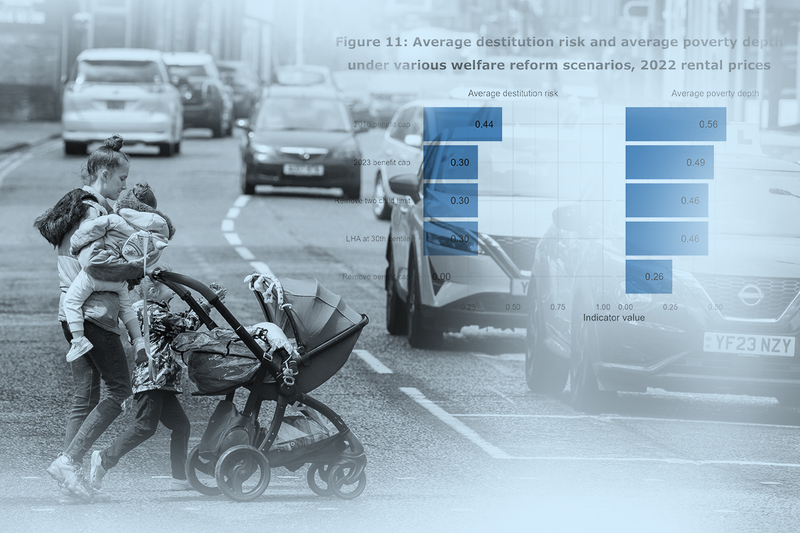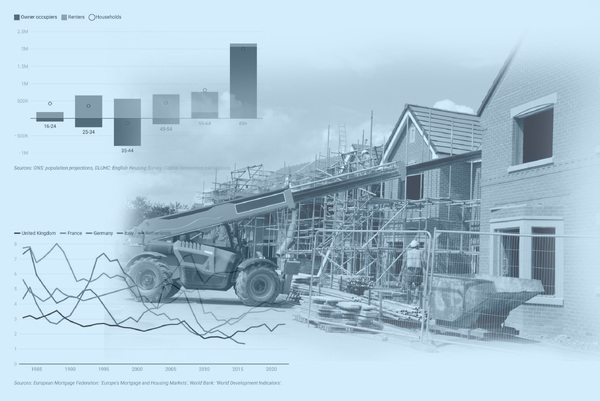You are viewing 1 of your 1 free articles
Latest housing research: a more equitable housing market?
Steve Moseley, group director of governance, strategy and communications at L&Q, and Thinkhouse Editorial Panel member, discusses a report on how the benefit cap impacts families’ housing choices, and another on housing equity
The summer is now behind us and the new Labour government’s honeymoon period has encountered its first bump in the road with the controversy over the winter fuel allowance. After the seismic change of the general election, it all feels rather familiar.
The period since the official state opening of parliament in July has felt a bit like the ‘Phoney War’. No sooner did parliament sit than it was rising again for conference recess, and there was plenty of signalling policy intentions but without much actual policy. But now, with the Autumn Statement on the horizon, and trade relations with doctors and train drivers finally restored, it feels like we are all ready to get down to business.
This is reflected in the seven reports published on the Thinkhouse website in August, which cover some familiar meaty structural housing issues such as the benefits system, planning, and the use of brownfield and the green belt, alongside some less well-trodden but equally interesting themes of social value, and the role of emotions and collective action in housing safety crises.
I have picked out two reports from the list this month. The first is Capped and trapped (in the UK’s housing market), a report produced by the Centre for Analysis of Social Exclusion at the London School of Economics. It analyses the impact of the benefit cap on families, focusing on the specific cohort of parents with three children. It’s a brilliant and brutal read in equal measure and you can’t fail to be impressed by both the quality of the research and the scathing assessment of the outcomes delivered by the cap. It critically assesses the approach of breaking the link between need and entitlement to support, and urges other countries to think carefully before seeking to emulate the UK experiment.
It examines why benefit-capped families don’t move to cheaper areas, in line with one of the intended outcomes from the introduction of the policy. Using Zoopla data, it finds that even ignoring the social upheaval such moves cause, there were only enough suitable properties in the country in 2022 to house one in six capped families. And even if all benefit-capped families moved to the cheapest properties in their local area, 44% would still be capped to the point where their living standards “fall below a standard definition of destitution”.
It talks about the interaction of the cap with the Local Housing Allowance and how the cap “takes a policy which already accentuates poverty… and makes it worse” and remarks that “policymakers should be careful about applying simplistic theories of change to welfare reforms”. Ouch!
It concludes with: “Our principal message… is for the UK to remove the cap as a vital precursor to tackling poverty in general and child poverty in particular.”
Among the wide range of policy papers and asks sitting on the desks of new ministers – many of which propose structural change that will take years to embed and deliver – there is an opportunity on the back of this research to do something meaningful and quickly, which will lift many families out of poverty. That gets my vote.
The second report I’ve picked out is indeed one of those reports discussing the longer-term structural change required. Brick by Brick is a pamphlet from the Fabian Society authored by Simon Graham. Those familiar with Simon’s work as practitioner, consultant and journalist covering housing will be well aware of his ability to produce powerful written work that is both evocative and inspirational to read. Everyone has their own particular preferences when reading research and one of mine is that it is actually interesting and easy to read.
Brick by Brick certainly does that. It grabs you from the opening summary, highlighting the profound impact the quality and cost of housing has on people’s health, finances, job prospects, educational attainment, mobility, family formation and aspiration. This opening section frames the pamphlet with the question: “Is there not a better way of organising and managing the property market that is more equitable?”
To help the reader consider that question, Brick by Brick guides them through a series of chapters describing how we got here, what the principles of a functioning housing market look like, and the challenges and risks associated with not achieving this. It is clear at the outset that the intention is not to make detailed policy prescriptions, but instead make the case for changing course and give some pointers on how it could be managed.
What is evident is the conclusion that a clear national strategy for housing is needed, setting the framework for government to work to and allowing for genuine accountability.
I will leave the last word to Simon, who calls for a third push to address housing, evoking the language of previous, successful interventions by the government in the 1930s and ’50s and declaring that the duty to restore economic sense and value to the housing system is a “profound moral responsibility”. I couldn’t agree more.
Steve Moseley, group director of governance, strategy and communications, L&Q; and member, Thinkhouse Editorial Panel
Sign up for our daily newsletter
Already have an account? Click here to manage your newsletters












